| Reviews & Columns |
|
Reviews DVD TV on DVD Blu-ray 4K UHD International DVDs In Theaters Reviews by Studio Video Games Features Collector Series DVDs Easter Egg Database Interviews DVD Talk Radio Feature Articles Columns Anime Talk DVD Savant Horror DVDs The M.O.D. Squad Art House HD Talk Silent DVD
|
DVD Talk Forum |
|
|
| Resources |
|
DVD Price Search Customer Service #'s RCE Info Links |
|
Columns
|
|
|
Revenge of a Kabuki Actor
AnimEigo // Unrated // October 14, 2008
List Price: $24.98 [Buy now and save at Amazon]
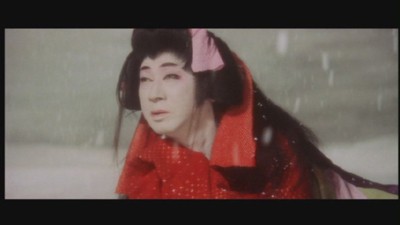
The Film:
There's no subtlety behind the rhythm that Kon Ichikawa's Revenge of a Kabuki Actor (aka An Actor's Revenge) follows, as the film conducts itself as a mirror to the kabuki's play structure. It starts by gradually and slowly introducing Yukinojo (Kazuo Hasegawa) as a well-revered gender-blurred actor who has also learned the arts of combat due to the enraged loss of his parents at a young age. While performing in the first of only a few glimpses into his actual stage talent, his darting glances find his parents' killers in the audience. Amid his performance, he begins to plot murderous revenge by, in essence, telling the film's audience through recurring narration exactly how he plans on achieving his satisfaction. It sets up the opportunity for well-orchestrated character drama, a rhythm that would carry through a broad core of bold, exciting developments through the center of the performance. It's only natural that Ichikawa's pseudo-kabuki production would build to a sharp, explosive conclusion.
Revenge of a Kabuki Actor truly exists as an experiment in lavish mise en scene, an effort by Kon Ichikawa to transport simplicity into visual splendor. His cinematic motives successfully smear the staged extravagance of kabuki performances into the real-life settings, rendering Yukinojo's trail of revenge as his grand performance. It's an insightful process to compare Ichikawa's execution of sitting conversation scenes with that of Yasujiro Ozu's; where Ozu maintains symmetry and delicateness in his backdrops and foregrounds to accentuate slight gestures and movements in character demeanors, Ichikawa's lavish scenes are cluttered with bright blasts of color and intricate shapes. Instead of accentuating these characters, it works to the opposite effect in matching their projection and, in turn, muting it ever so slightly. Standing scenes like the beautiful dark blue combat scene in the forest, however, are incomparable. Ichikawa's cameraman, Setsuo Kobayashi, utilizes similar visual techniques to Masaki Kobayashi's Kwaidan -- potentially because both directors may've been swapping visual ideas around the time. Once the film grows more and more erratic, the visual style complicates along with it; Ichikawa's film has one of the more gorgeously photographed scenes of engulfing structure fires I've seen, one that's bold and effective in its tightly-edited and short-lived span of time.
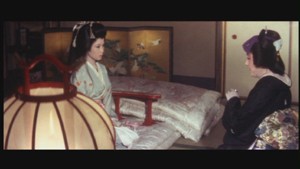
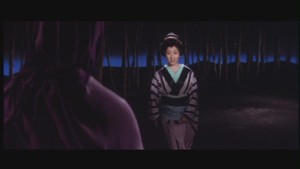
Intricate visual style also has an impact on Revenge of a Kabuki Actor's narrative, as well. Ichikawa's film slowly becomes a tangible exercise in aesthetic storytelling, an effort that lets body language and color mood comminucate directly with the viewer in the style of dramatic acting in the ways that the focal hero's profession allows. It's one of those pieces of cinema that could have the language track removed from the film and you'd still be able to decipher at least nine-tenths of the activity going on-screen. That's not to say that the dialogue isn't interesting, which it can be in a generic revenge-dialogue kind of way much akin to the likes of Lady Snowblood, but the words coming from the characters' mouths isn't near as significant as their dramatic projection -- something that all parties involves nail down splendidly. Revenge of a Kabuki Actor shares similarities to Toshiya Fujita's film in rhythm, since it's hinged on infiltrative, itemized vengeance.
But, as to be expected, the most interesting and gravitational element in Ichikawa's film is Yukinojo, the oyama "cross-dressing" kabuki samurai engulfed by desire for revenge. Kazuo Hasegawa's portrayal of the role had me curious, to say the least. Revenge of a Kabuki Actor concentrates on his bizarre, somewhat off-setting demeanor as the pseudo-flamboyant "female" actor. It takes a leap of faith to believe in the character's efforts towards exacting revenge on his parents' murders while he portrays himself as a somewhat delicate entity, but that's obviously all part of his meticulous cover-up. Honestly, it's hard to decide whether I'd rather see Ichikawa's vengeful hero show flickers of attributes that would back up the claims that he's a masterful warrior. Kazuo Hasegawa's meticulous performance, in that right, is a potent effort in ambiguity that keeps you on your toes -- guessing. It's only when the actor pops up in his "other" role as the infamous thief that you truly see how strained and compelling Kazuo Hasegawa's bizarre projection as Yukinojo can be.
In this atmosphere of plotting revenge and gender manipulation, focus is drawn to the ways the rest of the cast play off of Yukinojo's "captivating" persona. Ichikawa makes certain to give him/her a fluent range of differed entities to work with -- from the lavishly enamored daughter Namiji he uses as an entry pawn into his parents' killers infrastructure, to the competitive acting student enraged with jealousy towards the actor's exquisite capabilities -- so that a broad range of emotions can be addressed around the character. In this ensnaring of differential moods in his interactions, Ichikawa's film shares one of the very limited comparisons to one of his earlier, more recognizable works, Burmese Harp. He uses these characters as illustrative segment devices for Yukinojo's multi-layered personality: his "love interest" shows his capability for restraint and practical acting, while the samurai consistently reinvigorates ideas of Yukinojo's strengthening talent.
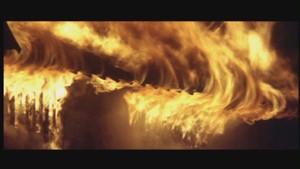
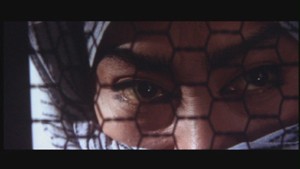
When the female thief Ohatsu, played with striking precision by Fujiko Yamamoto, falls in between both of these, she robs elements from both the affectionate entracement Namiji displays to the competitive, volatile energy that Yukinojo's schoolmate energy pushes forth. It makes Revenge of a Kabuki Actor a fluidly-ranged character drama that dances so gracefully around its ambiguity that it constastnly leaves emotional interpretation in a state of question. It shows its most solid convictions when Yukinojo uses some of his/her efforts to weaken rice barons into bringing product to the impoverished region for cheap sales, an effort both used as an attack mechanism and as a way of servicing the people -- but, as expected, more of the first.
In the line of Japanese revenge films that cropped up during the '60s and '70s, Revenge of a Kabuki Actor probably carries one the strongest, most concentrated and effective usages of minimal action. Less frequent than Lady Snowblood and not nearly as boldly presented, its energy renders excitement in quick, effective bursts that graduate and decline in rhythms that allow for the intricate dramatic flow to do the same. It references back to the rhythm of the kabuki performances -- alternating between bursts of lavish action and graceful, pensive motion. It takes a while to mold to Ichikawa's rhythm with Revenge of a Kabuki Actor, as well as growing accustomed to the bizarre rhythm that Kazuo Hasegawa infuses the main character's mood with; once it starts to build with the second act, however, it's very difficult to stray from Yukinojo's plight for revenge, rendering a compelling character study that enchants the eyes and engagingly challenges the audience's filmic perception in equal strokes.
The DVD:
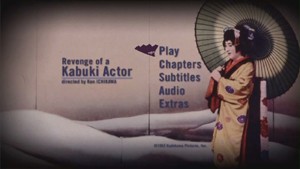
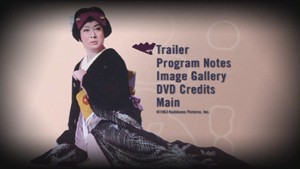
AnimEigo presents Revenge of a Kabuki Actor as an addition to its Samurai Cinema collection, featuring attractive coverart that embodies the mood of the film perfectly.
The Video:
As with Animeigo's other presentations in the live-action spectrum of Japanese cinema, this effort for Revenge of a Kabuki Actor looks quite nice. This 2.30:1 transfer has its limitations in its anamorphic widescreen image, but makes the most of them in a splendid display of color replication and detail competence. On a whole, this '60s color Japanese image has a hazy disposition, rendering a bit of a blurry nature to most of the scenes. Also, grain can get a little digital in mid-dark shots. It also carries noticeable reel-shift damage in the form of a white streak at the top of the image intermittently, as well as a few scenes where unpolished line damage can be seen. Now, with those little grievances out of the way, Ichikawa's film looks surprisingly good for a lesser-circulated Japanese film from the '60s. The broad spectrum of colors, both in muted scenes and in the director's visual experimentation sequences, project from the screen in aptly loud fashion -- though never seeming overly saturated or enhanced. Most impressive, however, is the rendering of details against clothing and backdrops, which come out with solidly-etched intricacy. Though a little foggy, it was a wholly enjoyable visual experience.
The Audio:
Much like their recent package for The Wolves, AnimEigo has offered two language options: Restored Audio, and Original Audio, both in Dolby 2.0 form. And, almost exactly like the other disc, Revenge of a Kabuki Actor sounds fine in both. The restored track, though it cleans up a lot of the buzz / hum issues in the audio department, sounds a little thinner and metallic than the original audio. However, there are still a few problems with strained, noisy vocal strength at several points. Vocal clarity is fine, as are score presentation and the limited sound effects. Once again, the choice between the two is a balance between sound expansiveness and the annoyance of analog hiss -- but both handle themselves just fine.
The Subtitles:
AnimEigo continues their record of strong subtitle composition, but they throw out a major addition to their repertoire. There are the three regular subtitle options -- All Subtitles, Dialogue Only, and Captions Only -- but they're offered in both Yellow and White coloring. Many film lovers have issues with subtitle coloring, arguing clarity over loudness of color between the two shades. Here, you've got a choice in between the two that, probably, was chosen for this release because of the visual nature of the film. Outstanding effort from AnimEigo.
The Extras:
But, like their other releases, Revenge of a Kabuki Actor lacks a bit in the supplements department. All we've got here are an anamorphic Trailer, and Image Gallery, and Animeigo's recurring expansive textual material in the Program Notes portion. Serviceable supplement, though they'll leave enthusiasts a little dissatisfied.
-----
Final Thoughts:
Both an involving character study and an overwhelming visual experience, Kon Ichikawa's Revenge of a Kabuki Actor radiates as a scaled achievement in cinematic beauty. Its reliance on non-verbal communication through design, though plenty of dialogue is spoken, offers a unique, concentrated effort to replicate stage-to-screen style of theatrics in a wholly engaging way. But Kazuo Hasegawa's 300th film performance becomes the reason that you become entranced by the splendor of it all, which challenges and compels equally. Both this superb revenge film and AnimEigo's solidly-crafted presentation of it come very Highly Recommended, especially to those who relish in distinct cinematic exercises from classic, historical films.
|
| Popular Reviews |
| Sponsored Links |
|
|
| Sponsored Links |
|
|
| Release List | Reviews | Shop | Newsletter | Forum | DVD Giveaways | Blu-Ray | Advertise |
|
Copyright 2024 DVDTalk.com All Rights Reserved. Legal Info, Privacy Policy, Terms of Use,
Manage Preferences,
Your Privacy Choices | |||||||














